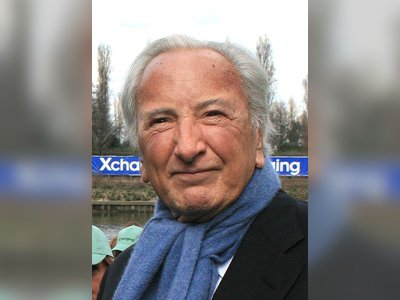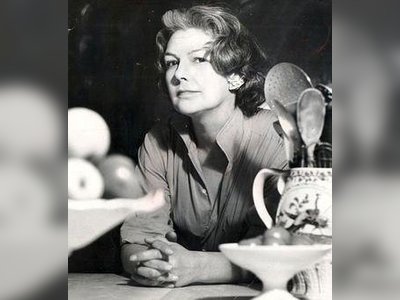British Heritage
Remember, Cherish, Learn.
beta
Jay Rayner
A Connoisseur's Influence on British Heritage.
Early Life and Education: The Making of a Critic
Born to Desmond Rayner and esteemed journalist Claire Rayner on September 14, 1966, Jason Matthew Rayner — known as Jay Rayner — grew up in a family that instilled in him an appreciation for diligent inquiry and the power of the written word. His Jewish heritage and upbringing in the Sudbury Hill area of Harrow moulded him into a culturally aware and sensitive individual. His intellectual vigour was further fostered at the independent Haberdashers' Aske's Boys' School, an institution known for shaping some of the brightest minds in Britain.
Rayner's passion for journalism was evident early on. He attended the University of Leeds to study politics, a choice that offered him a unique lens through which he would later view the culinary world. While at university, Rayner honed his skills in journalism as the editor of the Leeds Student newspaper, eventually graduating in 1988.
A Flourishing Career: From News to Nourishment
As Rayner began his career as a freelance journalist, his insightful writing and keen observation found favour with the readers of renowned newspapers, such as The Observer and The Independent on Sunday. His talent was recognised early on, earning him the Young Journalist of the Year award in the British Press Awards in 1992.
His journalistic journey led him to The Guardian, The Mail on Sunday, and eventually, The Observer. It was here that he would find his niche, becoming the Observer's restaurant critic in 1999. In an act of remarkable understanding and sensitivity, Rayner pledged to stop publishing negative reviews during the COVID-19 pandemic in 2020, acknowledging the struggles faced by the restaurant industry.
His work was not limited to newspapers. He authored several pieces for popular magazines, including GQ, Esquire, Cosmopolitan, the New Statesman and Granta, demonstrating his versatility as a writer.
Literature and Broadcasting: A Multi-Faceted Talent
Rayner's literary prowess was displayed in his novels. The Marble Kiss, his debut novel, was shortlisted for the Author's Club First Novel Award, while his second novel, Day of Atonement, was a contender for the Jewish Quarterly Prize for Fiction. His first non-fiction book, Stardust Falling, published in 2002, led the way for his third novel, The Apologist, which was published in the US as Eating Crow.
Apart from writing, Rayner made significant contributions to broadcasting. In 1997, he won a Sony Radio Award for his presentation of Papertalk, a BBC Radio Five Live's magazine programme. He later chaired a BBC Radio 4 programme, The Kitchen Cabinet, further solidifying his influence in the field.
His discerning palate found a platform on television as well. He served as a critic on Eating with the Enemy and MasterChef UK, and as a food reporter on the BBC's The One Show. His role on American programme Top Chef Masters and guest appearance on The Final Table extended his influence beyond the UK.
Rayner also hosts the Out to Lunch podcast, offering an intimate setting where he interacts with celebrity guests over meals.
Personal Life: Of Beards and Jazz
In addition to his professional accolades, Rayner was awarded the title Beard of the Year in 2011 by the Beard Liberation Front, showing that his influence extends to personal style. A man of diverse interests, he plays piano with his jazz ensemble, the Jay Rayner Quartet, further adding to his multifaceted persona.
A Legacy Enshrined in British Heritage
Jay Rayner has undoubtedly left an indelible mark on British culture and journalism. As a food critic, he managed to weave socio-political narratives into his reviews, contributing significantly to the discourse on food in the UK and beyond. Through his novels, radio shows, and television appearances, he expanded the boundaries of traditional journalism, creating a multifaceted career that spans multiple mediums.
Above all, Jay Rayner's legacy is a testament to the importance of critical engagement, authenticity, and empathy in journalism. He has truly contributed to shaping British heritage, leaving an enduring impact on the fields of food criticism, literature, and broadcasting in the UK. His story serves as an inspiration for future generations of journalists, demonstrating that a passion for exploration, curiosity, and a commitment to truth can make a lasting difference in society.
- Jay Rayneren.wikipedia.org


